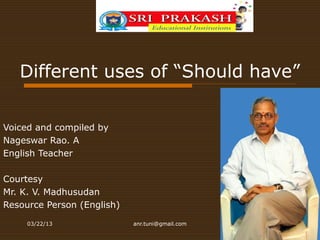
Usage of 'should have'
- 1. Different uses of “Should have” Voiced and compiled by Nageswar Rao. A English Teacher Courtesy Mr. K. V. Madhusudan Resource Person (English) 03/22/13 anr.tuni@gmail.com
- 2. We can use 'should have' to talk about past events that did not happen. • I should have let her know what was happening but I forgot. • He should have sent everybody a reminder by email. We can also use 'should have' to speculate about events that may or may not have happened. • She should have got the letter this morning. I expect she'll give us a call about it later. • He should have arrived at his office by now. Let's try ringing him. 03/22/13 anr.tuni@gmail.com
- 3. We can use ' should not have' to speculate negatively about what may or may not have happened. • She shouldn't have left work yet. I'll call her office. • He shouldn't have boarded his plane yet. We can probably still get hold of him. We can also use 'should not have' to regret past actions. • I shouldn't have shouted at you. I apologize. • We shouldn't have left the office so late. We should have anticipated this bad traffic. • They shouldn't have sacked him. He was the most creative person on their team. 03/22/13 anr.tuni@gmail.com
- 4. Visit us at “ayalasomayajula nageswar rao” For More videos on Functional & Usage Grammar. Subscribe to our channel on You Tube 03/22/13 anr.tuni@gmail.com
